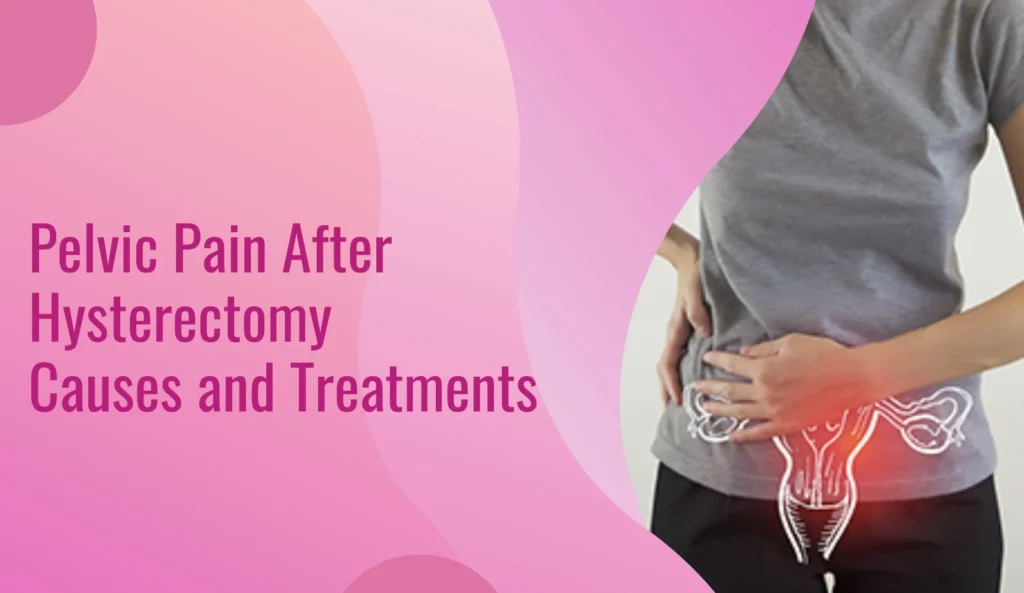-
Ganesh Talkies, Kolkata
Ganesh Talkies, Kolkata

Admins
30.05.2025
Relieve pelvic pain after hysterectomy safely with trusted, evidence-backed strategies—guided by a reputed gynecologist—for recovery, comfort, and long-term well-being. Why Pelvic Pain After Hysterectomy Happens Pelvic pain after a hysterectomy can come as a surprise. Many people expect to feel better after the surgery, not worse. But the truth is, the body goes through major changes after a hysterectomy, and sometimes, pain becomes a part of the healing process. Why Pelvic Pain After Hysterectomy HappensHow to Relieve Pelvic Pain After Hysterectomy SafelyReconnect with Your Body Through Pelvic Floor TherapyGentle Movement Can Make a Big DifferenceHeat Therapy: Simple, Soothing, EffectiveFocus on Anti-Inflammatory FoodsStay Hydrated and RestedListen to Your Emotions TooHow the Best Gynecologist Can Support Your RecoveryMost Asked Questions About Pelvic Pain After HysterectomyHealing Is a Journey, Not a Race Here are a few common causes: Post-surgical healing: Scar tissue formation and internal healing can cause discomfort for weeks or months. Nerve irritation: Pelvic nerves may become hypersensitive or irritated during surgery. Pelvic floor dysfunction: Weak or overactive muscles can lead to pain and pressure. Bowel and bladder changes: Surgery may alter the positioning or function of these organs. Understanding the reason behind your pain is the first step to manage it effectively. And in today’s medical landscape, solutions are not only available—they’re increasingly safe and supportive. How to Relieve Pelvic Pain After Hysterectomy Safely Relieving pelvic pain doesn't always mean medication. Often, a combination of approaches brings the best results, especially when guided by expert care. Reconnect with Your Body Through Pelvic Floor Therapy Pelvic floor muscles support your uterus, bladder, and bowel. When these muscles are weakened or tense after surgery, it can trigger pain. A trained therapist may guide you through: Biofeedback therapy Manual muscle release Breathing and posture techniques Core stabilization routines This therapy is especially effective when guided by experienced gynecologists who specialize in post-operative recovery and understand the nuances of pelvic health. Gentle Movement Can Make a Big Difference After any surgery, rest is important—but so is movement. Gentle activities like walking or light yoga can help: Increase blood flow Prevent stiffness Reduce inflammation Ease tension in surrounding muscles Avoid anything high-impact until your doctor says it’s okay. Start with 10–15 minutes daily and increase slowly. Heat Therapy: Simple, Soothing, Effective Sometimes, simple solutions offer real relief. A warm compress or heating pad on the lower abdomen or back can: Relax muscles Improve blood circulation...

Admin
29.05.2025
Hello Reader! Welcome to the blog page of Dr. Megha Khanna, one of the best lady gynecologist in Kolkata. Hysterectomy — the surgical removal of the uterus — is a common procedure performed for a variety of reasons including fibroids, endometriosis, chronic pelvic pain, or uterine cancer. While most women experience relief from the symptoms they had prior to the surgery, some may develop pelvic pain after hysterectomy, which can be concerning, frustrating, and sometimes debilitating. As the best lady gynecologist in Kolkata, I often meet patients who are confused about why they still feel pain after a major surgery that was meant to relieve their symptoms. Understanding the possible causes and available treatments can help ease anxiety and guide better recovery. Why Does Pelvic Pain Occur After Hysterectomy?1. Nerve Damage or Entrapment2. Scar Tissue (Adhesions)3. Residual Ovary Pain4. Vaginal Cuff Dehiscence5. Pelvic Floor Dysfunction6. Infection or InflammationWhy do I experience pain after hysterectomy even months later?When to Seek HelpWhat Can Be Done?When to See a Doctor for Pain After Hysterectomy?What are the common causes of persistent pelvic pain post-hysterectomy in Kolkata women?Treatment Options for Pelvic Pain After Hysterectomy1. Medications2. Pelvic Floor Physical Therapy3. Hormonal Management4. Surgical Intervention5. Psychological SupportPreventing Pain After HysterectomyHow does scar tissue formation contribute to pain after hysterectomy, and what can be done?What Can Be Done About Scar Tissue Pain After Hysterectomy?FAQ1. Is it normal to have pelvic pain after a hysterectomy?2. What are the common causes of pelvic pain after hysterectomy?3. How is pelvic pain diagnosed after a hysterectomy?4. Can pelvic pain after hysterectomy be treated?5. When should I see a doctor for pelvic pain after hysterectomy?Final Thoughts Why Does Pelvic Pain Occur After Hysterectomy? Experiencing pain after hysterectomy doesn’t always mean something is wrong. It’s important to distinguish between normal post-surgical healing and chronic or recurring pain that may indicate another issue. Here are some possible causes: 1. Nerve Damage or Entrapment During a hysterectomy, especially abdominal or laparoscopic ones, small pelvic nerves can be stretched or inadvertently damaged. This may result in neuropathic pain — a sharp, burning, or shooting pain in the pelvic area. 2. Scar Tissue (Adhesions) After surgery, the body’s natural healing process can lead to the formation of adhesions — bands of scar tissue that bind internal tissues or organs together abnormally. These adhesions can cause pelvic organs to stick to each other, resulting in discomfort and chronic pelvic...

Admins
26.05.2025
Vaginal birth recovery requires proper nutrition. Discover expert-backed guidance from a well-known gynecologist to support your postpartum health. Why Nutrition Matters After Childbirth Motherhood brings indescribable joy—but it also brings immense physical change, especially after a vaginal birth. While the focus often shifts to newborn care, the mother’s healing is just as important. A mother’s body works overtime—recovering from delivery, adjusting hormonally, and possibly producing milk. Why Nutrition Matters After ChildbirthThe Body’s Needs After Vaginal BirthEssential Nutrients for New Moms1. Protein – The Building Block of Recovery2. Iron – Replenishing Blood Loss3. Calcium & Vitamin D – For Bone Strength4. Fiber – Aiding Digestion5. Omega-3 Fatty Acids – Brain & Mood SupportBest Foods to Include in Your Postpartum DietFoods to Avoid Right After Vaginal BirthHydration: The Unsung HeroRecovery-Friendly Lifestyle Tips for New MomsWhen to Consult a Reputed GynecologistFAQs About Postpartum NutritionQ: Can I take weight-loss diets immediately after a vaginal birth?Q: What if I’m a vegetarian or vegan?Q: How long should I follow a special diet?Q: Is ghee actually good post-delivery?Nourish to Flourish The foundation of this recovery? Good nutrition. It's not just about calories—it's about supporting tissue repair, boosting energy, managing mood swings, and building strength for motherhood’s physical and emotional demands. The Body’s Needs After Vaginal Birth Every woman’s postpartum journey is unique. However, most will experience: Vaginal soreness or stitches (from tears or episiotomies) Bleeding (lochia) and iron loss Fatigue from disrupted sleep and body changes Hormonal shifts causing emotional ups and downs Lactation (if breastfeeding), requiring additional nutrients Meeting these needs with balanced meals can accelerate healing and improve mood. It's no wonder that a reputed gynecologist will always stress the importance of postpartum nutrition in follow-up consultations. Essential Nutrients for New Moms 1. Protein – The Building Block of Recovery Protein helps rebuild tissues, especially where tearing or stitching has occurred during a vaginal birth. Sources: Eggs, chicken, fish, lentils, paneer, tofu, nuts Tip: Include protein in every meal to sustain energy 2. Iron – Replenishing Blood Loss Post-delivery bleeding may reduce iron levels, which leads to fatigue or dizziness. Sources: Leafy greens (like spinach), red meat, beans, fortified cereals Tip: Pair with Vitamin C (citrus fruits) to enhance absorption 3. Calcium & Vitamin D – For Bone Strength Breastfeeding draws calcium from your bones—make sure your intake is adequate. Sources: Dairy, almonds, fortified plant milks Tip: Get 15–20 minutes of sunlight daily for Vitamin...

Admin
22.05.2025
Hello Reader! Welcome to the blog page of Dr. Megha Khanna one of the best lady gynecologist in Kolkata. Welcoming a baby into the world is a life-changing experience. While the focus often lies on the newborn, it is equally important to prioritize the mother's health and well-being after childbirth. Postpartum care plays a vital role in a woman’s recovery, especially after a vaginal delivery. As the best lady gynecologist in Kolkata, I, Dr. Megha Khanna, believe that comprehensive postnatal care is essential for a smooth transition into motherhood. In this blog, I will walk you through everything you need to know about postpartum delivery care after a vaginal birth — from physical recovery and emotional well-being to hygiene and follow-up checkups. Understanding the Postpartum PeriodPhysical Recovery After Vaginal Delivery1. Perineal Care2. Managing Vaginal Bleeding (Lochia)3. Uterine Contractions4. Bowel and Bladder CareEmotional Well-Being and Mental HealthBreastfeeding and Breast CareNutrition and HydrationExercise and MobilitySleep and RestWhen to Call the DoctorFollow-Up AppointmentsWhat are the key steps in postpartum delivery care after a vaginal birth?1. Immediate Monitoring and Rest2. Perineal and Vaginal Care3. Managing Vaginal Discharge (Lochia)4. Supporting Physical Recovery5. Pelvic Floor Exercises6. Bowel and Bladder Care7. Emotional Well-being8. Breastfeeding Support9. Follow-Up Care10. Watch for Warning SignsHow does skin-to-skin contact aid postpartum bonding and recovery?Promotes Bonding and Emotional Well-beingSupports Physical RecoveryEnhances Breastfeeding SuccessReduces Newborn Stress and Promotes ComfortStrengthens Immunity and HealthWhy is managing bleeding and uterine contractions crucial in postpartum care?What hygiene practices are recommended for caring for the perineum after birth?FAQFinal Words by Dr. Megha Khanna – Best Lady Gynecologist in Kolkata Understanding the Postpartum Period The postpartum period begins immediately after childbirth and extends up to six weeks or more. This is a time when a woman's body undergoes numerous physical and hormonal changes as it returns to its pre-pregnancy state. It is also the period when new mothers need maximum support, rest, and proper medical guidance. As the best lady gynecologist in Kolkata, I often remind new mothers that recovery doesn’t happen overnight. Giving yourself time and grace is key. Physical Recovery After Vaginal Delivery 1. Perineal Care After a vaginal delivery, the perineum (area between the vagina and anus) may be sore, especially if you had stitches due to tearing or an episiotomy. To reduce discomfort: Use cold packs to ease swelling. Take warm sitz baths. Keep the area clean and dry. Use prescribed ointments or sprays. 2. Managing...